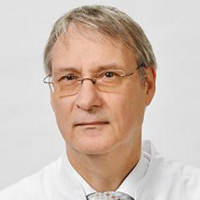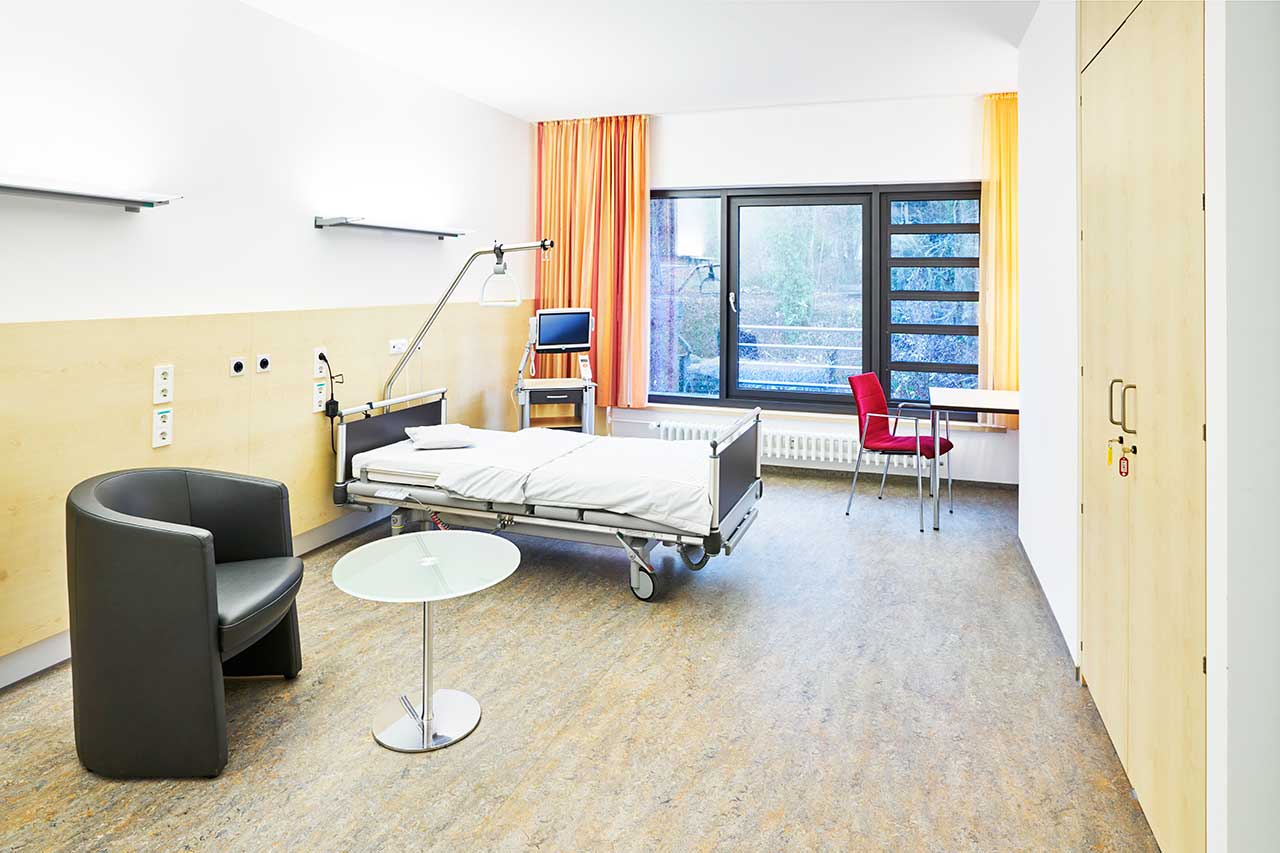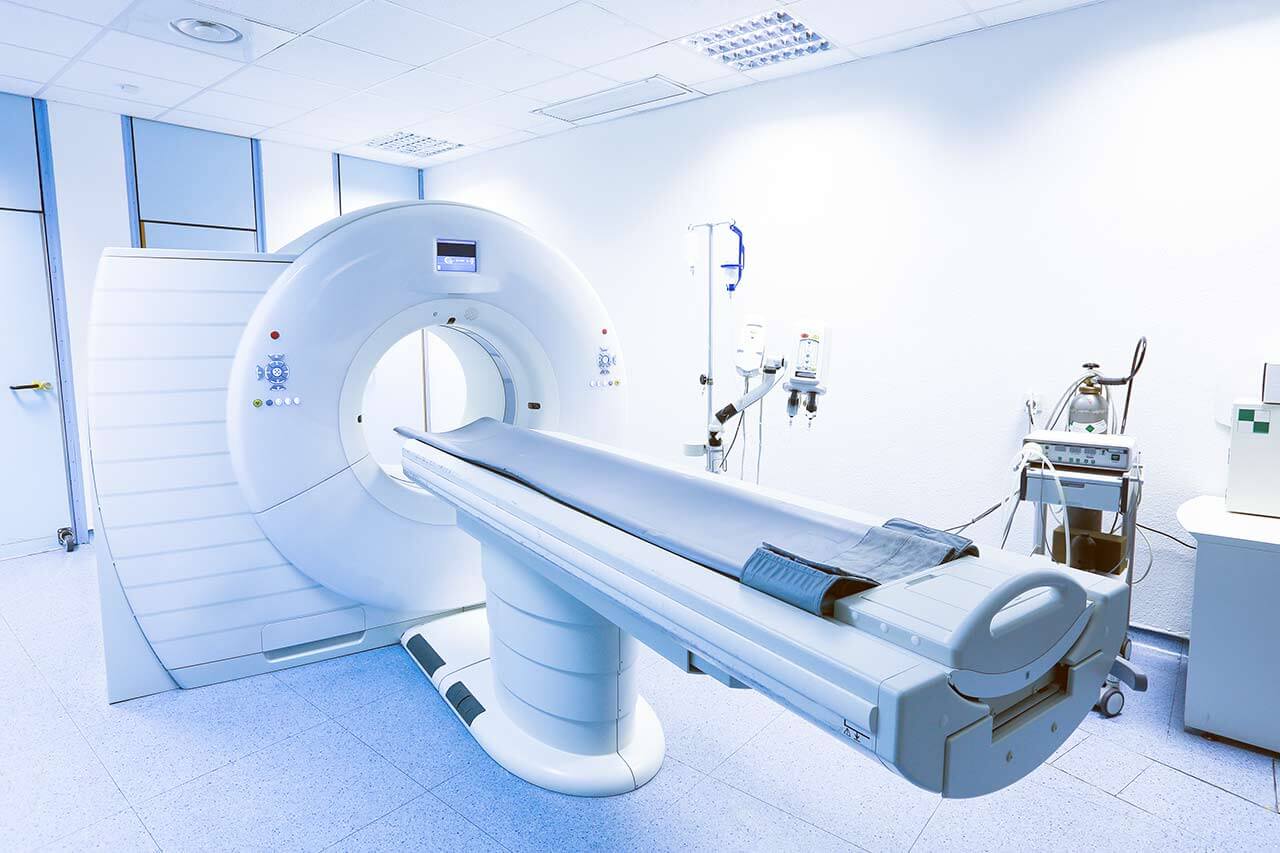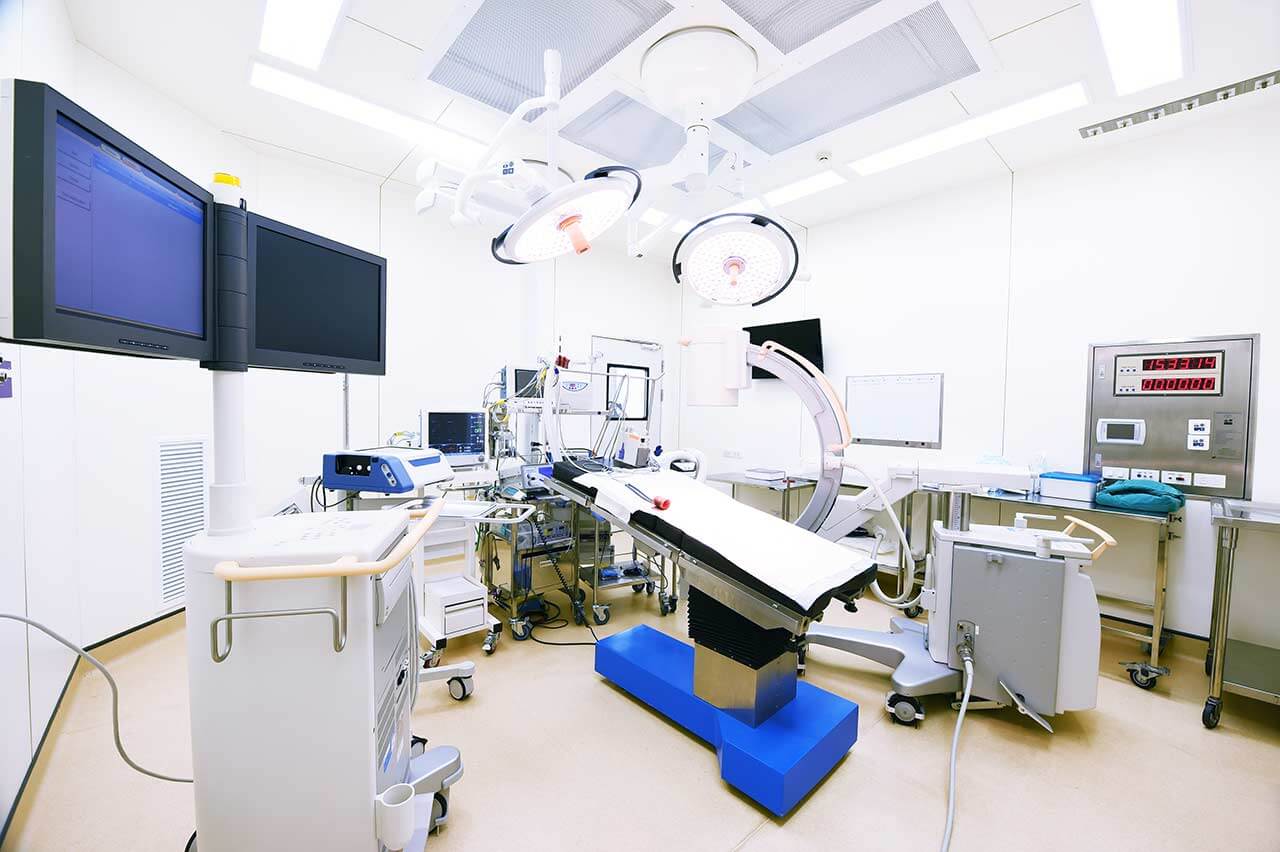
The program includes:
- Initial presentation in the clinic
- clinical history taking
- review of medical records
- physical examination
- laboratory tests:
- complete blood count
- general urine analysis
- biochemical analysis of blood
- TSH-basal, fT3, fT4
- tumor markers
- inflammation indicators
- indicators of blood coagulation
- CT / MRI of the abdomen and retroperitoneum
- abdominal and retroperitoneal ultrasound scan
- full curse of radiotherapy
- nursing services
- consultations of related specialists
- explanation of individual treatment plan
How program is carried out
During the first visit, the doctor will conduct a clinical examination and go through the results of previous laboratory tests and instrumental examinations. After that, you will undergo an additional examination, including complete blood count, laboratory assessment of liver and kidney function. Based on the received results, the physician will conduct radiotherapy planning with the help of CT or MRI, make the permanent tattoo marks on the skin and conduct CT simulation in order to assess the accuracy of the rays and the radiation dose. If necessary, related medical specialists will be involved in the elaboration of a treatment regimen (tumor board).
Radiation therapy is carried out as the day hospital procedure, without mandatory admission to the hospital. At each visit, the physician will assess your general condition and the marks on the skin. After that, you will be placed in a shielded radiation therapy room, on a special table.
Each radiation therapy session lasts less than half an hour (including preparation). All this time, doctors and nurses are monitoring your condition, you can communicate with them through a loudspeaker. The procedure is completely painless. Depending on the planned course of treatment, you will visit the hospital from 1 to 3-5 times a week.
After the completion of the radiation therapy course, you will undergo control examinations aimed at assessing your condition and efficacy of treatment. After that you will receive the medical report with detailed recommendations regarding further follow-up and treatment. In the future, you will be able to have a distant consultation with your attending physician and schedule the next course of treatment, if necessary.
Required documents
- Medical records
- MRI/CT scan (not older than 3 months)
- Biopsy results (if available)
Service
You may also book:
 BookingHealth Price from:
BookingHealth Price from:
About the department
According to the Focus magazine, the Department of Adult and Pediatric Radiation Therapy at the University Hospital Erlangen ranks among the best German medical facilities specializing in radiation therapy!
The department offers the full range of services in this medical field and is one of the most modern departments of this kind in Germany. The medical facility provides comprehensive treatment for various malignant diseases, which includes both radiation therapy and maintenance therapy (for example, pain therapy, diet therapy). The department uses state-of-the-art technical equipment, which allows for the most effective irradiation of the cancer focus with minimal harm to healthy tissues. In addition, the department provides innovative types of treatment – interventional radiation therapy and regional deep hyperthermia. All medical services comply with the highest international standards, and the department's medical team strictly adheres to radiation protection standards. The department's doctors have long clinical experience, and therefore they competently select the optimal course of radiation therapy for each patient to destroy cancer cells. The treatment is provided in close cooperation with oncologists, chemotherapists and other experts from related specialties. The Chief Physician of the department is Prof. Dr. med. Rainer Fietkau.
Different tumors require different forms of radiation therapy, which the department's specialists carry out in modern rooms equipped with the state-of-the-art medical equipment. On July 20, 2021, an innovative Halcyon linear accelerator manufactured by Varian was put into operation in the department. It is a unique device with an innovative circular gantry design and a patented multi-leaf double-layer collimator, which allows for targeted irradiation of the tumor with maximum preservation of healthy tissues and organs. Visually, the Halcyon device is very similar to a CT machine. Reduced noise levels, a low and smooth-moving treatment table and soft recessed lighting make the patient feel as comfortable and safe as possible during treatment. The main advantage of the new device is the fast speed of imaging and its highest quality, thanks to which the attending physician can be sure that the radiation beams are directed exactly at the tumor and do not damage healthy adjacent tissues.
Since radiation therapy is one of the main components of clinical protocols for cancer treatment, the department's medical team admits patients suffering from various types of cancer: breast cancer, oncological diseases of the female and male reproductive organs, gastrointestinal tract and urinary system, soft tissue sarcomas, head and neck tumors, lung cancer, etc.
Doctors, medical physicists, radiobiology specialists, technical assistants and nursing staff cooperate closely with other departments of the hospital, thereby ensuring the most favorable treatment outcomes. Prior to a course of radiation therapy, doctors carefully plan the upcoming treatment with computed tomography. After the completion of radiation therapy, patients receive follow-up care – the necessary medical care and medical advice.
It is worth noting that the department's specialists made a significant contribution to the development of radiation oncology in Germany. The department has also gained a reputation as a center of reference for various oncological diseases and participates in promising international research projects.
The department offers the following types of radiation therapy:
- Image-guided radiation therapy
- Extra- and intracranial stereotactic irradiation
- Hyperthermia
- Hypofractional high-precision high-dose radiation therapy
- Intensity-modulated radiation therapy (IMRT, VMAT)
- Interventional radiation therapy (brachytherapy)
- Radiochemotherapy
- Radiation therapy for pain relief
- 3D conformal radiation therapy
- Other types of irradiation
The department's range of medical services includes:
- Organ-preserving breast treatment in women – partial breast irradiation
- Definitive or consolidation radiation therapy for lymphomas
- Definitive radiochemotherapy for primary inoperable pancreatic cancer
- Total body irradiation before bone marrow transplantation in children and adults
- Neoadjuvant radiochemotherapy for esophageal cancer
- Surgical radiation therapy (brachytherapy) for breast cancer, prostate cancer, tumors of the head and neck, cervix, uterus, vagina and external genital organs, penis and choroid
- Radiochemotherapy with deep hyperthermia for superficial and muscle invasive bladder cancer (as an alternative to primary cystectomy)
- Postoperative and definitive radiochemotherapy for brain tumors
- Primary radiochemotherapy of the upper digestive tract
- Primary radiochemotherapy for anal cancer
- Primary radiochemotherapy for lung cancer
- Radiochemotherapy for rectal cancer before surgery (neoadjuvant) or after surgery (adjuvant)
- Radiation therapy for benign diseases such as degenerative joint diseases, endocrine ophthalmopathy, Dupuytren's contracture or Ledderhose disease (cicatricial degeneration of the plantar or palmar aponeurosis), as well as radiation therapy before and after joint replacement surgery (for the prevention of calcification)
- Other medical services
Curriculum vitae
Higher Education and Professional Career
- 1976 - 1982 Study of Medicine at the Universities of Bochum, Saarbruecken and Wuerzburg.
- 1976, 1983 Military Service.
- 1982 - 1984 Research Fellow at the Institute for Medical Radiology at the University of Wuerzburg.
- 1984 - 1988 Assistant Physician, Department of Adult and Pediatric Radiation Therapy, University Hospital Erlangen.
- 1988 - 1989 Assistant Physician, X-ray Unit in the Department of Surgery at the University Hospital Erlangen.
- 1989 - 1993 Senior Physician, Department of Adult and Pediatric Radiation Therapy, University Hospital Erlangen.
- 1990 Board certification in Radiotherapy.
- 1993 - 1994 Acting Head of the Department of Radiation Therapy at the University Hospital Goettingen.
- 1996 - 1997 C3 Professor of Radiotherapy, University of Erlangen-Nuremberg.
- 1997 - 2008 C4 Professor in Radiation Oncology, Radiation Therapy and Radiation Biology, University of Rostock.
- Since 2008 W3 Professor of Radiation Therapy, University of Erlangen-Nuremberg, as well as Head of the Department of Adult and Pediatric Radiation Therapy at the University Hospital Erlangen.
Memberships in Professional Societies
- German Society of Radiation Oncology (DEGRO).
- European Society for Radiotherapy and Oncology (ESTRO).
Photo of the doctor: (c) Universitätsklinikum Erlangen
About hospital
According to the Focus magazine, University Hospital Erlangen ranks among the best medical facilities in Germany!
The hospital is one of the leading healthcare facilities in Bavaria and offers top-class medical care distinguished by the close intertwining of clinical activities with research and training of medical students. The hospital was founded in 1815 and today is proud of its rich traditions, numerous medical achievements and an excellent reputation not only in Germany, but also in the international arena. The hospital has 25 specialized departments, 7 institutes and 41 interdisciplinary centers, whose experts work tirelessly for the benefit of their patients.
The hospital has the status of a maximum care center, and therefore it represents almost all fields of modern medicine. Oncology, transplant medicine, and robot-assisted surgery are among the top priorities of the clinical activities of the medical complex. Oncology is represented by the Comprehensive Cancer Center Erlangen, which is one of 13 centers of excellence in Germany certified by the German Cancer Society. The university hospital has a high-tech center with high success rates for heart, liver, kidney, pancreas, cornea and bone marrow transplants. In addition, the hospital is a leader in the use of robot-assisted surgery. The medical facility has at its disposal innovative robotic technologies, in particular the da Vinci Surgical System, with the help of which surgeons perform many sparing interventions in various medical fields.
The medical team of the hospital consists of highly professional therapists, surgeons and nursing staff. The focus of their efforts is on the patient, his health and peace of mind, as well as comfort during treatment. The clinical practice of doctors is based on an individual approach to each case, which results in high treatment success rates. State-of-the-art technical equipment also plays an important role in the therapeutic process. The hospital is proud of the most advanced devices for imaging diagnostics (X-ray, ultrasound, CT, MRI, PET-CT, SPECT-CT, etc.), endoscopic examinations, laboratory tests, as well as specially equipped operating rooms for robot-assisted interventions, image-guided therapeutic manipulations, minimally invasive and classical surgeries of any complexity. Thus, the doctors of the university hospital have all the necessary resources to effectively treat the most severe pathologies and save lives.
The combination of high-tech equipment, experienced and highly qualified personnel, as well as strict adherence to the standards of modern medicine, form a solid foundation for the provision of the best medical care at the European level. An undeniable proof of the high prestige of the hospital is the constantly growing number of patients who come here from various regions of Germany and other countries of the world.
Photo: (с) depositphotos
Accommodation in hospital
Patients rooms
The patients of the University Hospital Erlangen live in comfortable rooms with light colors and modern design. Each patient room has an ensuite bathroom with shower and toilet. The furnishing of the patient room includes an automatically adjustable bed with an orthopedic mattress, a bedside table, a wardrobe, a table and chairs for receiving visitors, a TV, a radio and a telephone. Wi-Fi can be provided upon request. The use of a mobile phone is prohibited in many rooms of the hospital.
Patients can also live in enhanced-comfort rooms with a more sophisticated design. The enhanced-comfort rooms additionally include upholstered furniture, a minifridge and a safe.
Meals and Menus
The hospital offers healthy and tasty food distinguished by many awards, including the 1st place in the prestigious ESSEN PRO GESUNDHEIT competition of the Bavarian State Ministry of the Environment and Consumer Protection.
The patient and the accompanying person have three meals a day. Breakfast is served buffet style: scrambled eggs, boiled eggs, sausage, cheese, bread and buns with butter and jam, cereals, etc. There are three set menus for lunch and dinner to choose from: a classic menu featuring local cuisine dishes, a Mediterranean menu and a vegetarian menu.
If for some reason you do not eat all the foods, you will be offered an individual menu. Please inform the medical staff about your dietary preferences prior to the treatment.
The hospital also houses many cafeterias, which will delight with a wide range of delicious dishes and drinks.
Further details
Standard rooms include:
Religion
The hospital regularly hosts catholic and evangelical devine services. The services of representatives of other religions are available upon request.
Accompanying person
During an inpatient program, an accompanying person can stay with you in the patient room or in a hotel of your choice.
Hotel
During an outpatient program, you can stay in a hotel of your choice. The managers will help you choose the most suitable options.




